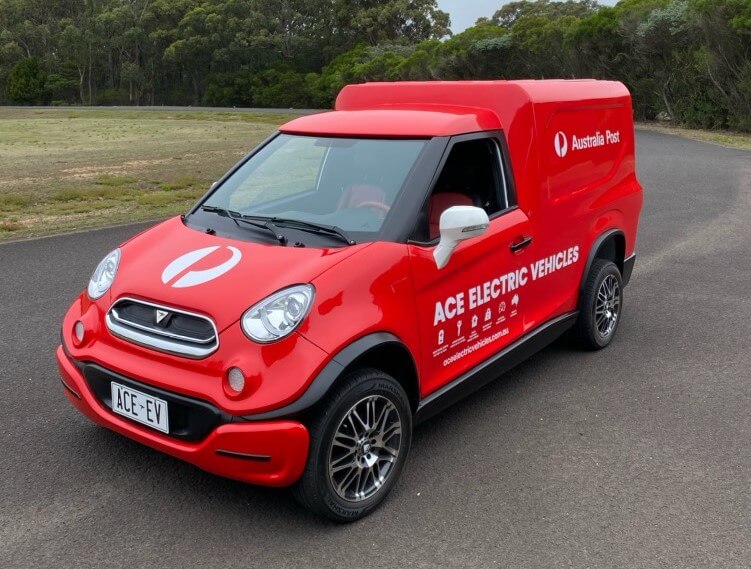Australian EV to kick-start local car making

An Adelaide-based electric car maker is hoping to kick-start Australia’s dormant car-making sector with the launch of three new electric vehicle (EV) models and bold plans to eventually build more than 24,000 EVs per year.
Australia’s car making industry came to an end in October 2017, when Holden closed its Elizabeth, SA, plant. Now, start-up ACE EV Group is hoping to kick-start car making in the state with plans to build a range of EVs, including a delivery van, a ute and small passenger car.

The man behind the project, Queenslander Greg McGarvie said he had initially hoped to locate manufacturing in his home state, but a lack of support had seen him gravitate to South Australia.
Mr McGarvie, who is listed as managing director of ACE EV Group, said the company’s first locally assembled vehicle was built in the workshops of the Motor Trades Association of Queensland (MTA Queensland and the company was still hopeful of locating its research and development facilities in Queensland.
South Australian Senator Rex Patrick has thrown his support behind the project, calling on the Federal and South Australian Governments to embrace the opportunity to bring vehicle manufacturing back to SA.
Speaking after the announcement earlier this month that ACE EV had signed a Memorandum of Understanding with Victorian computer software company SenSen Networks to develop autonomous driving capabilities for its EVs, Senator Patrick urged both levels of governments to back the establishment of an EV manufacturing plant in Adelaide.
"Electric vehicles are the cars of the future. When it comes to EVs in Australia, we don't want to just be buying them, we want to be building them too," Sen Patrick said.
"This is a serious opportunity for the return of vehicle manufacturing to SA and one that should be embraced by both the Federal and State governments.
“It's about 2000 direct and indirect jobs and a billion dollars of annual local economic activity when the program hits its peak."
Mr McGarvie said ACE EV planned to launch its range of Australian-made light commercial electric vans and cars here, with the first of its three-model range due as soon as 2021.
The ACE Cargo is described on the company’s website as an electric commercial vehicle, with a maximum pay load of 500kg, and a driving range of 150-200km with a partial load. Charging time of its 23.2 kilowatt-hour lithium-ion battery is listed as a maximum of eight hours on a home AC charging system, with the option of faster high voltage DC charging. The Cargo’s 0-50km/hr acceleration is listed as “under 7-seconds” and its maximum speed at 100km/hr.
At 3900mm long, the Cargo is about the same length as a Toyota Yaris, but the van is wider and taller than the compact Toyota, with a piggyback-style canopy protruding over the cabin to maximise cargo space.

Another model, the ACE Yewt, appears to be based on the same platform and tech package, with identical dimensions and performance, but with an open tray instead of the cargo’s enclosed back section.
According to the ACE EV website, both models offer “safe, reliable technology (that) ensures maximum range and efficiency, in a comfortable, practical package that will pay for itself faster than any other fleet vehicle available.”
Also featured on the site is the ACE Urban, which is described as, “a four-seater lightweight and nimble city car.” There are few other details provided, other than images which show a small three-door hatchback that appears to be built on the same platform as the other models.
Standard features of all three vehicles include electric power-assisted steering, electric seat heating, hill hold control, tyre pressure sensor, alloy wheels, and an electronic stability control system.
Mr McGarvie said he was targeting an on-sale date for the Cargo of late 2021 with a price of $29,995, while the Yewt is priced at $25,995 and scheduled for on-sale in early 2022.
Online reservations are now open for both models, he said, while reservations for the $35,995 Urban would open in February, with an on-sale sale of mid-2022.
Mr McGarvie said he vehicles are designed in Germany and Taiwan, with a Chinese sourced battery and electric motor, and a sub-frame made of lightweight but high strength carbon-composite, with local assembly taking around 18 hours per vehicle.
The company plans to manufacture around 24,000 units per annum once fully operational, with 70% of production destined for overseas markets, thanks to a Smart Pack design that makes the product suited for export and local assembly.
Related topics
Things to note
The information in this article has been prepared for general information purposes only and is not intended as legal advice or specific advice to any particular person. Any advice contained in the document is general advice, not intended as legal advice or professional advice and does not take into account any person’s particular circumstances. Before acting on anything based on this advice you should consider its appropriateness to you, having regard to your objectives and needs.
Insurance Products (excluding Travel Insurance) are issued by RACQ Insurance Limited ABN 50 009 704 152 (RACQI) and arranged by RACQ Distribution Services Pty Ltd (RDS) ABN 35 116 361 650, AFSL 567130 and RDS' authorised representatives (including RACQ Operations Pty Ltd ABN 80 009 663 414, AR No. 234978 (RACQO)). Conditions, limits and exclusions apply.
Any advice provided by RDS and RACQO is general advice only and does not take into account your personal objectives, financial situation or needs and you will need to consider whether the advice is appropriate for you. Read the Product Disclosure Statement (PDS) before making a purchase decision on the product. You can also access our Target Market Determinations on this website.
RDS receives a commission from RACQI for the policies it arranges. RACQO receives fees paid for services it provides to RDS. Further details about remuneration are available on request prior to purchasing.
Banking and loan products issued by Members Banking Group Limited ABN 83 087 651 054 AFSL/Australian credit licence 241195 trading as RACQ Bank. Terms, conditions, fees, charges and lending policies apply. This is general advice only and may not be right for you. This information does not take your personal objectives, circumstances or needs into account. Read the disclosure documents for your selected product or service, including the Financial Services Guide and the Terms and Conditions, and consider if appropriate for you before deciding.
Except for RACQ Bank, any RACQ entity referred to on this page is not an authorised deposit-taking institution for the purposes of the Banking Act 1959 (Cth). That entity’s obligations do not represent deposits or other liabilities of RACQ Bank. RACQ Bank does not guarantee or otherwise provide assurance in respect of the obligations of that entity, unless noted otherwise.
RACQ Bank subscribes to the Customer Owned Banking Code of Practice which establishes higher standards than the law requires. The Code reflects modern consumer expectations and developments in approaches to issues such as consumer vulnerability, guarantors, and supporting customers through financial hardship. Please read our Customer Owned Banking Code of Practice page for more information.
RACQ Operations Pty Ltd (ABN 80 009 663 414 AR 000234978) and Members Travel Group Pty Ltd (ABN 45 144 538 803 AR 000432492) are acting as an Authorised Representative of the issuer of the insurance, Tokio Marine & Nichido Fire Insurance Co., Ltd. (ABN 80 000 438 291 AFSL 246 548). Any advice set out above is general in nature only, and does not take into account your objectives, financial situation or needs. Before purchasing any travel products, please consider the RACQ Travel Insurance Product Disclosure Statement (PDS) and the Target Market Determinations (TMDs) that apply to these products. Whilst the PDS outlines the Terms and Conditions of these products, the TMDs outline the intended class of customers that comprise the target market for these travel products. This will allow you to consider which products best suit your objectives, financial situation and needs and consider the products appropriateness to your personal circumstances. TMDs also outline matters involving the distribution and the review of these products. The PDS, Supplementary PDS and TMDs for each travel product can be found here.

